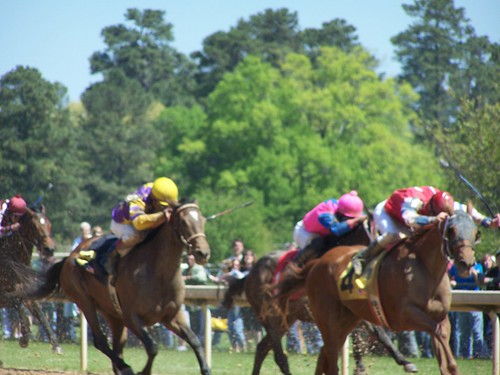
Horseracing is not like human sports. It’s not about the spirit of competition, or any of the paltry metaphors we use to explain our fascination with football and baseball. Horseracing is about a bunch of dumb, inbred animals running really fast. And that’s why I love it.
I started betting on horses about two years ago. I decided to parlay a bit of money I had won at a dog track in Florida into a few races at Belmont. I lost, but I was in love. Since then, I’ve made ten or twelve trips to the track, lost about $200 dollars, and read some books on handicapping. Like anyone starting out at the track, it’s become an article of faith that if I could only master the arcane science of the Daily Racing Form, I could predict which of those inbred animals would finish first each time out. It’s an imperfect notion, but one that forms the bedrock of every serious horseplayer’s efforts. The challenge of the horseplayer is to be at one with the Form, which publishes data on the past performance of every horse in every race at every track it covers. The data can be overwhelming. Do you bet on the horse who has won his last three races but has never won on this track over the horse that hasn’t won in two years but never loses on this track? On a muddy day, do you bet on the horse whose sire ran well in the mud over the mud-challenged horse who is generally the fastest in the field? And so on.
Mine That Bird’s inexplicable victory in the highest-profile race of the year exploded the notion that any of this wrestling with the Form is worthwhile. There was nothing in his past performance data that indicated any capability to defeat the field, never mind blow them away by almost seven lengths. The instinct on NBC, and among most sports fans, was to treat his win as the triumph of a plucky underdog, as if this were a track and field race. They’re missing the point. The thrill of horseracing is in the promise that a few pages of numbers, if interpreted correctly, can unveil the future, and open to you the wallets of those poor mopes who bet on the favorite. Mine That Bird’s victory gives the lie to that lovely notion.
Andrew Beyer, the father of modern handicapping, tried to explain away Mine That Bird’s win as a “once-in-a-lifetime perfect storm” for the horse. For his sake, I hope so. We’ll find out tomorrow.
In the meantime, check out some pictures of Derby day in Brooklyn from our copyeditor over at her new blog.
UPDATE: That was a pretty amazing race. Rachel Alexandra was dominant, as most predicted, but Mine That Bird’s last-to-second charge was stunning. I’m regretting some of what was said above. I had some money on a Rachel Alexandra, Musket Man, Pioneerof the Nile boxed trifecta. Two out of three ain’t bad, except in a trifecta, where it’s nothing.
